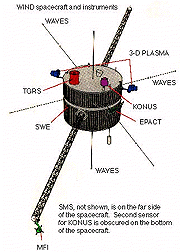 Satellites which study their local environment usually do so for some scientific purpose.
Satellites which study their local environment usually do so for some scientific purpose.
Some of these move in circular orbits, relatively close to Earth--for instance, FAST which analyzes the intricate structure of electric currents, particles and fields in the curtains of the polar aurora, and MAGSAT which in 1979-80 orbited just above the atmosphere and mapped the Earth magnetic field with great precision. A follow-up magnetic survey is scheduled to start in 1999 with the launch of the Danish "Oersted" satellite. Many "down-looking" satellites also carry out local observations, among them Polar, Viking, Freja and satellites of the GOES and DMSP series. Perhaps the most interesting satellites in this group are the ones sent into distant orbits, some of them extending well past the Moon--e.g. the WIND spacecraft pictured here. Among them is a long series of IMPs (Interplanetary Monitoring Platforms) which sampled the Earth's distant magnetic environment, the magnetosphere, and the surrounding interplanetary region; IMP-8 (now shut down) was still returning good data, more than 20 years after its launch. Other explorers of the distant magnetosphere have included the three ISEE spacecraft (International Sun-Earth Explorers), Polar in an elliptical polar orbit with cameras observing the polar aurora, and Image observing energetic neutral atoms. It also includes the European HEOS 1 and 2, Russia's Prognoz series and Interball, and Japan's Akebono, Jikiken and Geotail. |